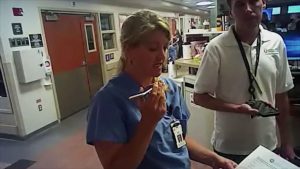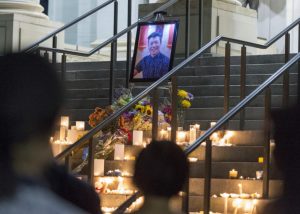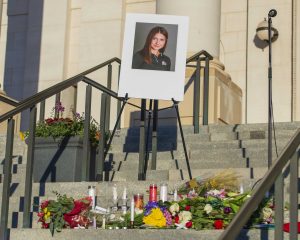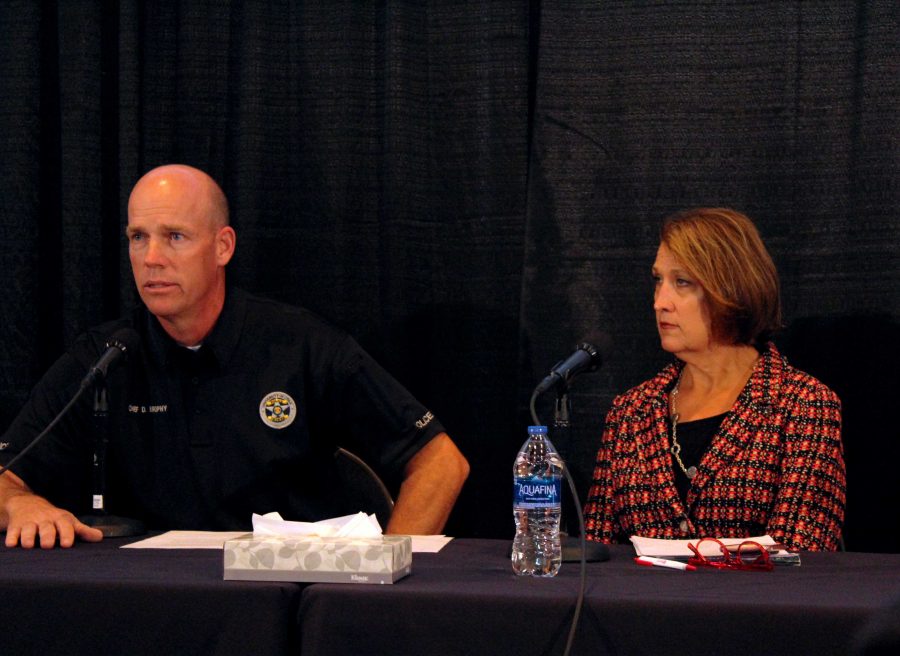U Police Chief Dale Brophy Suddenly Announces Retirement
University of Utah President Ruth Watkins and University Police Chief Dale Brophy spoke at a press conference on the investigation into the death of student Lauren McCluskey on Oct. 25, 2018 | Chronicle archives.
July 16, 2019
In a statement Tuesday afternoon, University of Utah officials announced that U Police Chief Dale Brophy will retire on Oct. 15 of this year.
Brophy has worked with the department since 2013, when he joined as deputy police chief. According to the statements, he was promoted to police chief two years later. Before starting at the U, he worked for West Valley City Police Department for 19 years. Over that period of time, he held multiple positions in the department, including as a sergeant and lieutenant.
In an email to his employees, Brophy said, “This has not been an easy decision, but the timing is right. This move will open a new chapter for me and provide the department an opportunity to continue forward under new leadership.” He also wrote that he plans to “pursue other opportunities.”
Brophy’s retirement comes after he and his department were involved in multiple high profile cases, including three murders on campus since December 2016. Some cases were controversial.
On Halloween in 2016, a woman reported being raped at gunpoint in the parking lot near the Merrill Engineering Building on campus. Despite allegations of a gun-related crime, a safety alert wasn’t sent to students, faculty and staff until more than two hours after police received the report. The campus community was notified a month later that the case had been dismissed in an email, in which Brophy stated, “We are not calling into question that this person may have experienced something terrible at some point in her life, but we are not able to find evidence that a crime occurred at the place, date and time reported.”

Students protested over the delayed safety notifications and a student-led group called SLC Against Sexual Assault met with then-President David Pershing over the language Brophy used in the email. In a letter at the time, the group wrote that “While it is not explicitly stated, the subtext of Chief Brophy’s statement is that the survivor lied about the assault. […] It places the victim on trial rather than the perpetrator, which is a particularly harmful message to send to those who have been sexually assaulted.”
Later, the Salt Lake Tribune reported that federal government officials found that there were “potentially serious shortcomings” in the communications to the campus community about the incident. They also said the U wasn’t complying with legal requirements to release information about crimes to the public.
A little over a month later, U police responded to a murder-suicide in the parking lot of Research Park’s ARUP Laboratories, which is a non-profit company owned by the University of Utah according to their website. Katherine Peralta, a 25-year-old ARUP employee, was shot multiple times by her husband Richard Peralta, 23, who then shot himself. Katherine died on the scene. Richard was transported to University of Utah Health, where he later died.

Then, in July 2017, a Salt Lake City police officer forcibly arrested a nurse, Alex Wubbels, at University of Utah Health after a confrontation in which she refused to let him obtain a blood sample from an unconscious patient without a warrant. During that confrontation, she called campus police. U police officers responded to the hospital but did not intervene. Security guards, who also worked under Brophy, didn’t intervene either.
It was later found that the arrest violated SLCPD policies, and two SLCPD officers directly involved were disciplined.
At the time, Brophy said, “The incident that occurred at University Hospital in July involving nurse Wubbels was mishandled and created a stressful situation that could have been avoided.” He also said his officers “could have stepped up” and that they “should have been” advocating for the nurse.
“To use a metaphor to describe this situation, when our security was asked to take the ride with Alex, we jumped in the back seat when we should have been riding shotgun. Alex conducted herself in a very professional manner, did everything right and did not deserve to be subjected to arrest for doing her job,” Brophy said.

(Photo by Kiffer Creveling | The Daily Utah Chronicle)
Then, on Oct. 30, 2017, U police responded to another murder on campus. International student Chenwei Guo, 23, was shot to death by Austin Boutain during an attempted carjacking near the gate to Red Butte Canyon.
Eight law enforcement agencies, including the U’s under Brophy, combed the mountains above the U, searching for Boutain. He was arrested the next day after being spotted in the Salt Lake City public library, and later accepted a plea deal to avoid the death penalty.
Almost exactly one year later, on Oct. 22, 2018, 21-year-old student-athlete Lauren McCluskey was murdered by ex-boyfriend Melvin Shawn Rowland near her dorm on campus. Rowland, a convicted sex offender on parole, later died by a self-inflicted gunshot wound during a police chase.

McCluskey had contacted U security and U police by phone more than 10 times in the weeks leading up to her death to report harassment and extortion she thought might have been carried out by Rowland and his friends. On the day she was killed, she also sent officers evidence that someone had texted her falsely claiming to be the department’s deputy chief and told them she thought Rowland was trying to “lure her” somewhere.
An independent investigation into how campus police handled McCluskey’s case found that U police didn’t start investigating McCluskey’s calls for a week after her first report because they were short-staffed and improperly trained to recognize the signs of domestic violence, didn’t know how to find out whether a suspect was on parole, didn’t conduct most of their contact with McCluskey face-to-face and didn’t coordinate well with other departments on campus.
In a winter 2016 interview with the U’s Continuum magazine, Brophy had said the department “spend[s] a lot of time and money on training our officers and detectives to ensure we are providing the service our community expects.”
The independent investigation made 37 recommendations to procedures in both Brophy’s department and the U’s housing department, which had also received concerning reports about Rowland. Many have already been put into place.
No officers were fired or otherwise disciplined for their handling of McCluskey’s case. The Salt Lake Tribune, however, reported that one of the officers McCluskey spoke with made similar mistakes while handling a Feb. 2019 domestic violence case on campus, after undergoing training for how to deal with such cases.
Three days after McCluskey’s death, U President Ruth Watkins said, “I want you to know that I have great confidence in the diligent work of the University Police Department, of Chief Brophy and of our officers.” She also later said she felt Brophy had “the ability, the talent and the commitment” to improve the U’s police department.
In Brophy’s email to staff, he wrote, “We have accomplished so much together and I am very proud of the work we have done. Our ability to prepare, respond, communicate and act have dramatically improved. Our pay, training, equipment and mission have made us a leader in the valley and a desired employer with the ability to attract highly qualified candidates. These improvements, along with numerous others illustrates our ongoing commitment to excellence. We are much better today than we were six years ago, none of which was possible without all of you.”
It’s unclear why Brophy is retiring now. In an email interview, U spokesperson Chris Nelson said that he was not asked to retire by the university and that there’s “no direct connection” between Brophy’s departure and the McCluskey case.
“Lauren’s death was a transformational moment on this campus in terms of overall safety and has resulted in significant changes and improvements in the university’s departments of public safety and housing and residential education,” Nelson said. “A new director of public safety will have the opportunity to take a fresh look at what we’re doing and to build on efforts to create a culture of safety on campus.”
Nelson also confirmed that Brophy accepted a severance package as part of his retirement. “Part of the retirement agreement includes a year of salary and benefits and his current salary is $151,000. His retirement as a police officer goes through the Utah Retirement System,” he said. Nelson also explained that, like all police officers in Utah, Brophy’s retirement is “slightly different than what a typical university staff member receives.”
Brophy is named as a party to the lawsuit McCluskey’s parents filed against the University. Nelson says he doesn’t expect the retirement will have any impact on that.
The statement announcing Brophy’s retirement declares, “A national search will be conducted to fill the position.” According to Nelson, the aim is to hire someone new before Brophy’s last day in October.









Zorb1996 • Jul 16, 2019 at 11:52 pm
Chief Dale Brophy’s department mishandled Lauren’s safety. He is now taking the fall for that. President Ruth Watkins (following a terrible advice how to minimize the risk of litigation, coming from the U General Counsel and some shady public relation firm) mishandled the aftermath of the murder, including giving a silent shoulder to the parents of Lauren, which eventually led to the $56M lawsuit. Will Watkins be taking the fall for that?
Brophy’s termination is deserved, but in all fairness he did not mishandle the 2016 Halloween rape allegations. The U police correctly determined that no rape occurred. Those who say that a rape victim (or an alleged rape victim) cannot be wrong and are accordingly outraged “over the language Brophy used in the email,” need a reality check. People say things that are not true for various reasons, including mental health problems, in the least. Brophy’s statement was factually correct and in fact quite respectful towards the alleged and unnamed victim. What else was he supposed to say if he determined (from physical evidence and victim/witnesses statements) that the victim was not telling the truth?